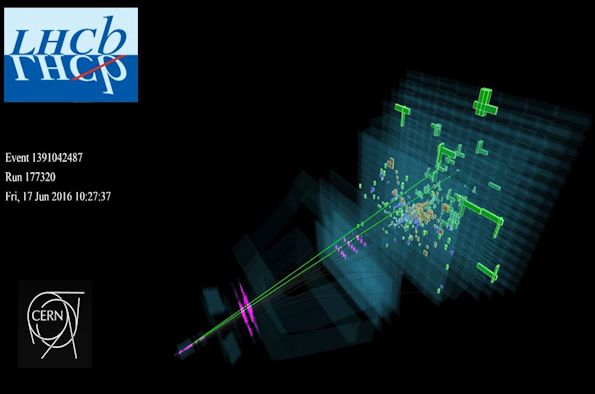Searching for the rarest glimpse of New Physics

Finding out what lies beyond our current understanding is the hottest topic in particle physics today. We have so many mysteries to solve, like dark matter and antimatter, and think answers might be found in New Physics – new physics processes and new particles – that we have yet to discover. The LHCb experiment at CERN’s Large Hadron Collider (LHC) is designed to shed light on this undiscovered realm by observing the subtle influence of New Physics on the properties of particles produced in proton-proton collisions.
LHCb has just announced the first observation of the decay of a particle called a Bs meson to two muons. The decay is well predicted but extremely rare in the Standard Model, in fact only just over three in every 1,000,000,000 Bs produced should decay this way (equivalent to one grain of sand in a delivery truck full). New Physics can interfere with the decay of the Bs meson and a measured deviation from the Standard Model prediction would be incredibly exciting.
The measurement is only made possible thanks to the exquisite precision of LHCb’s particle detectors. The VELO detector, built by the University of Liverpool, is key to LHCb’s ability to identify Bs mesons and record them in real time while the LHC produces data. Professor Themis Bowcock, Head of the Particle Physics group, says “this is exactly the physics this detector was built to do and it has taken us almost 20 years to achieve this result. “
LHCb’s measurement agrees extremely well with the Standard Model, showing that if New Physics is there, we need to search even harder to find it. Professor Tara Shears who leads the LHCb group is enthusiastic: “this result shows the amazing precision we can reach. We are now at the point where we can begin to make super-sensitive tests of the Standard Model”
With a new LHCb upgraded particle detector currently under construction, and the huge amount of extra data that LHC will deliver still to come, the hiding space for New Physics will get much smaller. LHCb is shrinking the unknown more and more. Dr. Francesco Dettori, who joined the Liverpool Particle Physics group in January and who led this discovery emphasizes its importance: “this is a really powerful tool for probing New Physics. I am very proud to be part of this venture”
VELO detector modules, built at Liverpool, are now part of the permanent collection of the London Science Museum.